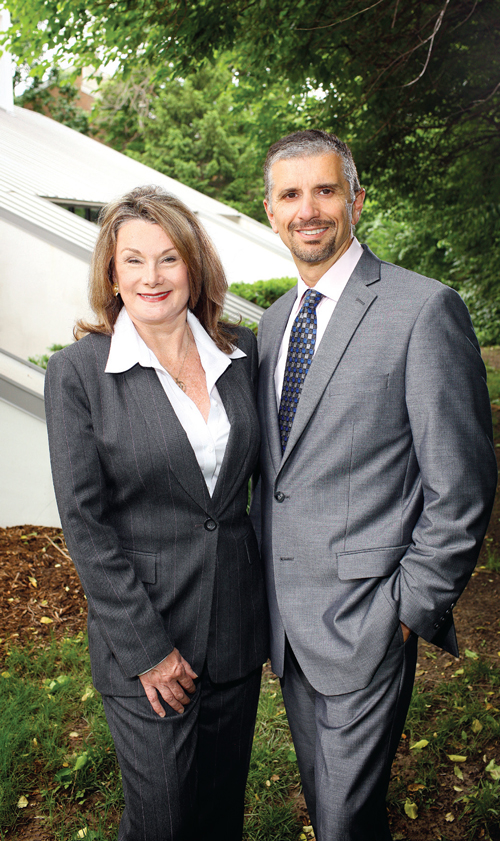All three women experienced vague symptoms – like bloating and gas that most of us have from time-to-time.
Each, Jennifer Lupo, Ann Kleinhans and Kathy Strojek, initially thought it nothing to worry about.
They questioned themselves as to what they might have eaten.
But their symptoms became frequent and persisted over months, and each felt something wasn’t quite right.
Lupo, 42, who was not yet menopausal, also, often had abdominal pain.
She said, “I never really had cramps when I was younger, but here I was doubled over, taking Midol and Aleve and using heating pads. I was often in pain and it was even worse when I had my period.”
All three were blindsided when told they had ovarian cancer.
IT WHISPERS WITH VAGUE SYMPTOMS.
“Ovarian cancer is a silent cancer,” said Dr. Al Elbendary, a gynecologic-oncologist on staff at Missouri Baptist who treated all three women. Gyn-oncologists are gynecologists who are trained to manage the complexities of cancer care.
“Unfortunately, it is often diagnosed in the advanced stages, because symptoms are vague. Women often think they have a gastrointestinal problem. Sometimes they’ll feel a mass or lump.”
Ninety-five percent of patients report bloating, fatigue, gastrointestinal disturbances, urinary symptoms, menstrual irregularities, abdominal or pelvic pain.
Strojek, 65, was diagnosed with Stage III cancer three years ago. “The symptoms were too easy to blame on something else. I thought it was a gastrointestinal problem as I had been on a prescription for acid reflux.”
“I’m grateful the GI doctor was sharp in seeing that there was more going on,” she said. He ordered some tests and referred her to Dr. Elbendary.
Lupo believes she’s fortunate; hers was caught in Stage I. “It’s a sneaky thing; most women don’t realize they have it,” she said.
She asked her first ob/gyn about her symptoms and was told not to worry. That answer didn’t satisfy her as things got worse. She just knew something wasn’t right.
“It was not going away, so I went to another ob/gyn.”
“When I did exercises, such as jumping jacks, I could feel a lump. It was different than a pregnancy lump,” said Lupo, who has an 18, 13 and eight-year-old.
“When I would lie on my stomach, I could feel something in there that didn’t belong. Even intercourse was painful.”
The ob/gyn ordered a CAT scan and tested her urine and blood, also ordering a CA-125 blood test, which measures cancer antigens in the body. She, also, was referred to Dr. Elbendary.
Kleinhans’ cancer, like Strojek’s, was caught at Stage III.
“My nephew is a doctor in St. Louis and after I was diagnosed with ovarian cancer, he told me I should see Dr. Elbendary for treatment,” said Kleinhans, 84, who travels from Texas for her appointments.
“I knew something was wrong,” said Kleinhans, who experienced about eight months of pain in her stomach before finding a physician who finally pursued an answer. “I was worn out and felt bad all the time, but I had no idea I had cancer.”
While Kleinhans is the first in her family to be diagnosed with ovarian cancer, cancer is not new to her mother’s side. Her sister had breast and lung cancer, her brother throat cancer and her mother cervical.
SCREENING FOR OVARIAN CANCER.
Gyn cancers, like endometrial and cervical cancers, are generally caught early because of pap smears and recognizable symptoms. Both have high survival rates. Bleeding, spotting or discharge, usually alert women that something is wrong.
Unfortunately, there isn’t a screening test for ovarian cancer. It is difficult to diagnose, even with an ultrasound.
“Always tell your doctor about any symptoms of bloating, constipation, appetite changes or back pain,” said Kate Burch, WHNP, women’s healthcare nurse practitioner and board-certified menopausal clinician at Dr. Elbendary’s office. “Those things may happen to all of us at some time, but an increase in frequency, severity, or symptoms that persist, should be evaluated.”
TREATING THE DISEASE.
Treatment plans are based on the cancer’s “stage.”
“In early Stage I, surgery alone can sometimes ‘cure’ the patient,” said Dr. Elbendary. “Or, sometimes, depending on the type of cancer cell, surgery and an abbreviated course of chemotherapy are enough.”
More advanced stages, though, generally require surgery and more extensive chemotherapy.
While Lupo’s tumor was confined to her ovaries, surgery removed her ovaries, fallopian tubes and uterus because microscopic cancer cells were found in these locations.
Her final chemotherapy treatment is to be completed in early fall.
“The pain went away after surgery and I can lie on my stomach now,” said Lupo. “Sometimes I tire quickly with chemo and I need plenty of sleep.”
Strojek, on the other hand, will have chemo the rest of her life as she has little tumors in her upper abdomen that have metastasized.
After Kleinhans had her surgery, she stayed in St. Louis for five months for chemotherapy. She now is on two different rotating oral medications that she will take for the rest of her life to help keep the cancer from growing.
She comes to St. Louis to see Dr. Elbendary about every three months.
CHOICE OF DOCTOR MATTERS.
Ovarian cancer is a potentially curable disease in one-third of women. And, thanks to recent advances in treatment, 46% of women with ovarian cancer are beating the five-year survival rate.
Recent medical studies show that your doctor’s qualifications can make the difference. Women treated by gyn-oncologists who specialize in ovarian cancer, have consistently “superior outcomes” than those treated by non-specialists.
“We’ve made great advances in treating ovarian cancer,” said Dr. Elbendary, who has devoted his career and medical practice to treating the disease. “Women’s survival, quality of life and outcomes are enhanced by specialized care that launches our arsenal of medical treatments at the cancer, while supporting women emotionally and keeping them physically strong.”
Kleinhans, Lupo and Strojek were all greatly encouraged by Dr. Elbendary, his staff and, unexpectedly, by the patients they met there.
Kleinhans said, “When I went into chemotherapy, all these ladies were sitting around the room and all had cancer. They have become good friends.”
Burch also encourages patients to enroll in STAR, a rehabilitation therapy program which helps cancer survivors live with minimal side effects from cancer treatments (see www.MissouriBaptist.org/STAR for more information).
“This great rehab/exercise program helps cancer patients fight fatigue and chemo brain. It can energize and improve depression, stress and reduce risk for other diseases,” said Burch.
IS OVARIAN CANCER INHERITED?
Only 10% of gyn cancers are hereditary.
“If two first-degree relatives have had cancer, it’s a just-do-it for genetic testing,” said Burch, referring to the fact that most insurance companies would cover it.
If a BRCA-1 or -2 mutation is found, risk of cancer jumps to 35-65%.
Dr. Elbendary said, “Genetic testing is an expensive procedure. The question we ask before testing is ‘Are you willing to do something about it?’ If not, there is no real point in knowing.”
EMBRACING LIFE.
When Lupo was diagnosed with her ovarian cancer, Dr. Elbendary encouraged her saying she couldn’t go through life worrying about it.
Lupo believes the best advice she can give other women is to not believe everything people tell you. “People have the best intentions, but listen to your doctor. And, live life.”
Why did Dr. Elbendary became a gyn-oncologist? “In med school, I envisioned myself as a happy obstetrician delivering happy babies, but one of my professors encouraged me to look at gyn-oncology because I showed talent for complex surgeries. Often, a general surgeon does not have the long-term relationship with patients that a gyn-oncologist does. I’m grateful that I can really make a difference in my patients’ lives. This field gives me that opportunity.”
Kleinhans, who has five children, 10 grandchildren and 15 great grandchildren, credits Dr. Elbendary with saving her life. “I’m not planning on going anywhere. I have too much to be here for.”
Her advice for women with ovarian cancer comes from some advice her grown grandson gave her: “Why don’t you join the ‘BBC’ club,” he said, when she was down about losing her hair with chemotherapy.
She asked him what that meant. He said ‘bald by choice.’
So, that she did. “Shaving my head made things much easier. And one of my friends at chemotherapy wore a cute little hat. I asked her where she got it. I went and bought several.”
Lupo, who is glad she trusted her instincts said, “I know there are hypochondriacs, but if something doesn’t feel right — get it checked out!”
Strojek said, “Cancer taught me not to stress the little things. Look at the flowers, the clouds. Appreciate it. Live your life every day.”
Al Elbendary, MD, is board-certified in gynecologic-oncology and on staff at Missouri Baptist Medical Center. He received his medical degree from Loyola University of Chicago and completed a combined internship/residency in obstetrics/gynecology at the University of Chicago Medical Center. He then completed a fellowship in gynecologic-oncology at Duke University Hospital.




